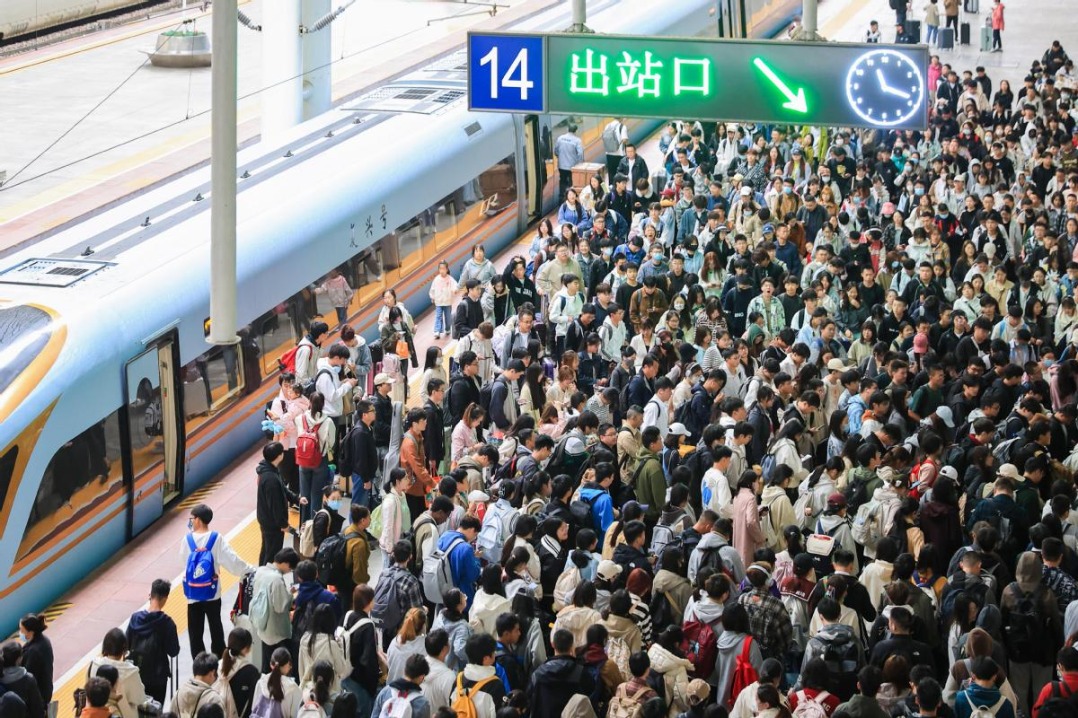Let's celebrate reform's 40th anniversary


As momentous historic events go, China's reform period was relatively unheralded. Little did anyone realize at the time -probably no one, in fact - that 1978 would enter the history books as one of the most important years in modern history.
We should not be surprised. At the time, the Chinese economy was a mere 5 percent of the size of the US economy, with a per capita GDP roughly on a par with that of Zambia, lower than half of the Asian average and lower than twothirds of the African average. China's impact on the world was very limited.

Although its growth rate had averaged a little more than 5 percent from 1960 to 1978, it compared rather unfavorably with economies such as Japan and the Republic of Korea. For the majority of the world's population, China was largely forgotten or ignored, usually both. Even in China, there was little anticipation that the country stood on the eve of a remarkable transformation. When Chairman Mao Zedong died in 1976, China was relatively isolated. The"cultural revolution" (196676) continued to cast a long shadow, the leadership was divided, and Deng Xiaoping had only begun to emerge as China's key leader. Notwithstanding the unquestioned achievements made since 1949, the future did not look particularly promising.
How wrong almost everyone was. Think of what have hitherto been regarded as some of the defining moments of the late 19th and 20th centuries: the rise of the United States between 1870 and 1914; the October Revolution; colonial liberation after World War II; and the fall of the Berlin Wall and the disintegration of the Soviet Union.
The reform period that began in 1978, and continues to this day, is at least as historically significant as all of these, if not more so. China's economic transformation since 1978 has been on a far greater scale than that of the US between 1870 and 1914. The October Revolution, historically profound as it was, ultimately failed. The reform period, in contrast, has succeeded in transforming not only China but the whole world.
If China's economic performance between 1960 and 1978 was overshadowed by the early "Asian tigers", since 1978 the roles have been reversed, with China growing much faster than any of its neighbors between 1978 and the present. China experienced an average GDP growth of close to 10 percent annually until 2014, raising per capita GDP almost 49-fold, from $155 at today's prices in 1978 to $7,590 in 2014, thereby lifting more than 700 million people out of poverty. Between 1990 and 2005, China was responsible for three-quarters of the world's poverty reduction. Since 1978, China's GDP has overtaken that of countless countries, including Britain, France, Germany and Japan, such that today it is second only to the US and closing rapidly.
But numbers alone cannot explain the historical magnitude and novelty of what China has achieved. Since the late 18th century and the beginning of Britain's Industrial Revolution, the global economy has been dominated by the advanced Western economies together with Japan, which, unlike all other nonWestern countries, began its industrialization in the 19th century. China is the first developing country (which, like a majority of the world's countries, had been colonized or partly colonized by the Western powers and Japan) to crash the party of the historically privileged and become recognized as one of the two most powerful countries in the world. China has not only transformed itself and the world, it has overturned more than 200 years of history in the process.
Without question, the reform period -which never would have been possible without 1949 and the victory of the Communist Party of China under Mao Zedong -is one of the most important historical events of the past two centuries. It has been responsible for the most remarkable economic transformation in modern history, arguably, indeed, in all of history.
Yet the 40th anniversary of the reform period's birth will be marked, if at all, in a relatively perfunctory way in Western countries. Part of the reason for this is that economic periods such as this generally receive less attention than their political or military equivalents: they are more protracted and less dramatic than the latter. But it is also because the West feels challenged by China's transformation.
The West has generally veered toward a negative interpretation of China's economic rise, for long predicting its unsustainability and ultimate demise. This is hardly surprising; as we can now all see, China's rise, in reconfiguring the world, is at the same time diminishing the West's place in that world. The causes of this can hardly be expected to be a reason for celebration in the West.
There is a further reason that the significance of the reform period has been underestimated, and this belongs rather closer to home: its relationship to the socialist tradition. The sheer novelty of Deng Xiaoping's thinking and approach has never been given the recognition it deserves. While the West for long belittled the reform period for political reasons, many on the left tended to believe that it represented a turn to the right in an era when neoliberalism was increasingly ascendant; they regarded it, in some degree or another, as a retreat from socialist principles. But this was a crude and simplistic response. Deng was, indeed, prepared to question some of the previously largely unquestioned assumptions of socialist thought, but he did this because he believed they no longer had a sufficient purchase on reality.
Prior to Deng, the communist movement, together with wider sections of the left, was for the most part committed to two key propositions. First, that socialism meant central planning and the public ownership of most of the economy. Second, the idea of socialism in one country, which first took root in the Soviet Union in the 1920s, came to enjoy widespread influence: it was based on the view that the world was bifurcated between socialist countries and capitalist countries, and never the twain shall meet.
Deng challenged both propositions. He embraced the idea of the market as a necessary part of a socialist economy. And he believed that it was essential for China, rather than being part of an autarchic socialist bloc, to seek to become part of and interdependent with the whole world, including the major capitalist countries.
The idea of socialism in one country emerged in the Soviet Union after the failure of the long-awaited revolutions in the major capitalist countries in the 1920s: as such, it represented a retreat into a defensive bunker. Deng's embrace of interdependence was based on the recognition that the capitalist world in the post-1945 period had proved rather more dynamic than the socialist world, and that China should not be afraid to extend its horizons and compete with them on a wider global stage.
Deng's approach was extraordinarily brave and bold. He recognized that the old ways of thinking were no longer working: in Mao's time-honored phrase, it was necessary to "seek truth from facts". Rather than choosing to remain a prisoner of one's own ideological dogma, he reached beyond in order to find a new way.
The consequences could not have been more profound or far-reaching. The turn to pragmatism, or seeking truth from facts, was intellectually enormously stimulating and liberating. Much of the Marxist tradition had become bogged down in the idea that it was invariably right, that history was on its side, that it was simply a matter of time before it triumphed. A mindset based on the "guarantees of history" led to ossified and mechanical thinking, a hardening of the intellectual arteries, and an inability to move with the times.
The dynamism that Deng's intellectual revolution unleashed has become a continuing and fundamental feature of China over the past 40 years. Or, to put it in another way, while the Soviet Union was trapped in its own dogmatic mindset and increasingly turned inward, exactly the opposite happened in China, which reached outward both within China itself and at the same time toward the rest of the world.
While the Soviet Union became ever more timid and defensive, China displayed growing confidence in its attitude toward the world.
There is much that the left around the world can learn from China: its expansive view, its pragmatism, its intellectual courage and ambition, its willingness to learn from anywhere and anyone, and its emphasis on doing and achieving rather than dogma and assertion.
The 40th anniversary of the beginning of the reform period is a cause for celebration and reflection, not only in China but around the world. It has so much to offer us all.
The writer is a senior fellow at the Department of Politics and International Studies, Cambridge University, a visiting professor at the Institute of Modern International Relations, Tsinghua University, and the author of When China Rules the World.
The views do not necessarily reflect those of China Daily.

































